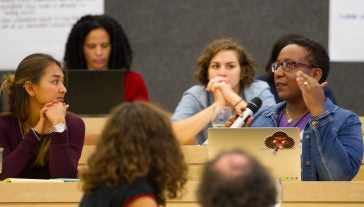 Change the Paradigm, Make Science Communication Inclusive
Change the Paradigm, Make Science Communication Inclusive
Science communication is a rapidly growing field with the potential to significantly increase public engagement and a sense of belonging in the fields of science, technology, engineering and math (STEM). However, even in our multicultural society, we often view one another through lenses shaped by our own preconceived biases and assumptions.
The University of Rhode Island’s Metcalf Institute and the Symposium planning committee invite you to submit a proposal for the 2019 #InclusiveSciComm Symposium, September 27-29, at URI in Kingston, RI. The Symposium is a national convening of practitioners, trainers, researchers and educators working across disciplines and STEM topics to discuss effective approaches to making science communication inclusive, equitable, and intersectional.
“Our 2018 symposium, the first national conference of its kind devoted to assessing the challenges and opportunities for inclusive approaches to science communication, demonstrated the strong demand for this type of gathering,” said Sunshine Menezes, Metcalf Institute Executive Director. “There is an urgent need for inclusive approaches to science communication that acknowledge and respect diverse perspectives and contributions. We’re casting an even wider net across the nation this year in hopes of engaging new people in this important conversation and integrating research and practice on inclusive science engagement.”
“The symposium increased my sense of belonging in the science communication field, especially as someone hoping to stay in academia and balance research with scicomm and advocacy,” said Christine Liu, Ph.D. candidate, artist, science communicator and 2018 Symposium speaker.
“You have created something so meaningful and novel,” said Rackeb Tesfaye, a Ph.D. candidate in neuroscience at McGill University in Canada, founder of the Broad Science podcast, and Symposium speaker. “I genuinely believe we will see lasting impact from the symposium, which so beautifully co-created knowledge and built capacity for our community and beyond.”
Proposals are being accepted for sessions, talks, workshops, and posters with submissions encouraged from practitioners, researchers and educators. The three-day symposium will include a variety of workshops and sessions focused on inclusive science communication skill-building, lessons learned, exploration of major gaps in effective research and practices of inclusive scicomm, and facilitating challenging conversations across difference.
Proposals should relate to one or more of three major themes related to inclusive science communication:
- New language, practices, knowledge and research
- Changing systems and structures through science communication
- Social responsibility and ethics
Deadline for proposals
Proposals must be submitted via inclusivescicomm.org by 11:59pm ET on May 24, 2019. Individuals are limited to one proposal submission as a lead facilitator, but may serve as a collaborator or co-presenter on one additional proposal. Questions should be directed to Sunshine Menezes at sunshine@uri.edu.
Symposium Fellowships for Researchers
Four Research+Practice Fellowships will be offered to researchers though a partnership between Research+Practice Collaboratory, a program that brings educators and researchers together to develop more equitable innovations for STEM teaching and learning, and the #InclusiveSciComm Symposium. Fellows will receive up to $2000 to attend the symposium. Researchers and grad students in areas of science communication, science learning, and public engagement are encouraged to apply. The application deadline has been extended to Monday, June 30, 2019.
About Metcalf Institute
Metcalf Institute is a global leader in providing environmental science training for journalists. The Institute also provides communication training for researchers from across the United States and offers free public lectures and webinars. Metcalf Institute was established at the University of Rhode Island in 1997 with funding from three media foundations: the Belo Corporation, the Providence Journal Charitable Foundation and the Philip L. Graham Fund, with additional support from the Telaka Foundation. The Institute joined the URI College of the Environment and Life Sciences in 2017.
